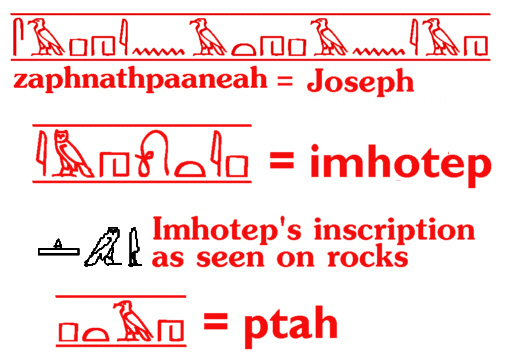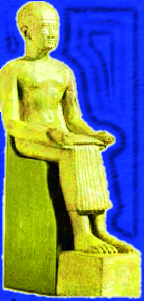|
Was Imhotep and Joseph
the same Person?
 by Betty Rhodes The Original Comparisons of Joseph & Imhotep 
Imhotep was the world's first named architect who
built Egypt's first pyramid, and is often
recognized as the world's first doctor, priest,
scribe, sage, poet, astrologer, and vizier, chief
minister - to Djoser (reign 2630–2611 BC), the
second king of Egypt's third dynasty. Imhotep may
have lived under as many as four kings. An
inscription on one of the kings statues states
Imhotep's titles as the "chancellor of the king of
lower Egypt', the "first one under the king", the
"administrator of the great mansion", the
"hereditary Noble", the "high priest of
Heliopolis", the "chief sculptor", and finally the
"chief carpenter".
By reading the following table it would appear that Imhotep and Joseph, son of Jacob, had many attributes in common - if not identical. Is this a pattern that has repeated - or were the two men one and the same person? My conclusion - Imhotep and Joseph were indeed the same person and the descendant of Ptah. |
| Joseph |
Imhotep Egyptian 3rd Dynasty Djoser 2630-2611 BC [verification link for dates] |
||
| second in command under Pharoah | second in command under Pharoah Djoser | ||
| lived to be 110 years of age | lived to be 110 years of age | ||
| great architect and builder | great architect and builder | ||
| stored up corn during 7 yrs of plenty | stored up corn during 7 yrs of plenty | ||
| saw seven years of famine - fed people | saw seven years of faminie - fed people | ||
| interpreter of dreams | interpreter of dreams | ||
| built pyramids & palaces | built the Step Pyramid & palaces | ||
| Zaphnath-paaneah (preserver of life) physician servants | was a physician | ||
| instituted an income tax of one fifth | instituted an income tax of one fifth | ||
| married into the Priesthood of On | married into the Priesthood of Heliopolis [On] | ||
| knowledge of astrology | knowledge of astrology | ||
| coat of many breadths/colors (pac (pas) = wide tunic) | -------------- | ||
| became an educated man | a poet and educated medical writer | ||
| overseer of works | overseer of works | ||
| legendary history | legendary history | ||
| name means to add, increase, to join or gather together | name means "the one that comes in peace" | ||
| was one of twelve siblings | was one of twelve siblings (see Ptah below) |
| PTAH, children
of: The architect of the Saqqara Step
Pyramid, Imhotep, after he became deified, came to be
regarded as the son of Ptah. As father and creator of
the gods, the deities he created first were Nun
and Naunet and the nine gods of the Ennead. The nine
were Tem, Shu, Tefnut, Geb, Nut, Osiris, Isis, Set,
and Nephthys who were considered to be both the teeth
and lips of the mouth of Ptah and the semen and the
hands of Tem.
Adolf K Placzek. Macmillan
Encyclopedia of Architects. Vol. 2. London: The Free
Press, 1982. p454-464. The name 'Jerusalem' means the habitation of peace (shalom). The name 'Solomon' means. 'peace-ful'. Many of the events of Imhotep's life parallel Joseph's life right down to the age he died, the famine, great architect, etc., (see chart below). Imhotep was the architect that 'invented' the hewn square stones and built the Step Pyramid at Saqqara/Sakkara near Memphis in Egypt. Imhotep was once believed to be a myth - but later excavations found evidence of his actual existence. Seems Imhotep was raised to the status of a 'god' beginning in the 18th Dynasty (1550 BCE). Imhotep was revered as the son of PTAH, a creator-god of Memphis, the patron god of craftsmen; equated by the Greeks with Hephaestus. The cult of Imhotep reached its zenith in Greco-Roman times when sick people slept in his temples with the hope that the 'god' would reveal remedies to them in dreams - much like Edgar Cayce's legendary abilities. The 'TA' in Ptah means earth. Take the P and H and add them to (D)Jose(r) and you have Joseph - which doesn't mean anything, but it is interesting just the same. Although Imhotep has been credited with innumerable architectural achievements, the only certainty is that he built the complex of King Neterikhet at Saqqara. When excavations were carried out at the Step Pyramid at Saqqara/Sakkara, fragments of a statue of pharaoh Djoser were found. The base was inscribed with the names of Djoser and of Imhotep: Permission must be given before using this information HOME |